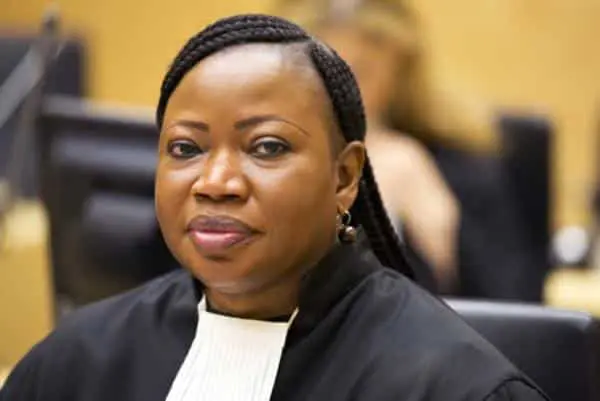
ICC Prosecutor Fatou Bensouda has said she is not yet done with her attempts to try President Uhuru Kenyatta for crimes against humanity.
Speaking in South Africa on the sidelines of a conference on legal aid in Africa, Bensouda said she still has several options.
“The charges are still hanging over Uhuru Kenyatta and the case is far from over. I still have options,” Bensouda told the Guardian newspaper’s Africa correspondent David Smith.
Last week, Bensouda asked the court to indefinitely adjourn Uhuru’s case to give the Kenyan government more time to cooperate with in accessing documents she needs to proceed.
The case against Uhuru, who was accused of stoking a wave of lethal inter-ethnic violence after Kenya’s 2007 presidential elections, has been postponed several times as prosecutors tried to gather more evidence.
“The accused person in this case is the head of a government that has so far failed fully to comply with its obligations to the Court,” Bensouda said, asking the judges to adjourn the case indefinitely.
“From an evidentiary standpoint, the situation is the same as when the Prosecution sought an adjournment of the trial date on December 19, 2013 – the available evidence is insufficient to prove Mr Uhuru Kenyatta’s alleged criminal responsibility beyond reasonable doubt,” Bensouda stated.
Uhuru’s lawyers led by Steven Kay were yesterday finalising a “lengthy response” to Bensouda’s filing. The lawyers, who have until end of the day today to file the response, are expected to ask the judges to terminate the case because “Bensouda has shown no cause why the case should continue”.
According to Uhuru’s team, the adjournment sought is unacceptable because it is premised on the same reasons she gave before.
They will also argue that it was the prosecutor’s “duty and obligation” to collect the necessary evidence before committing the case to trial.
Bensouda has said it would be “inappropriate” to withdraw the charges as Uhuru is head of the government that is frustrating her efforts to get evidence.
She wants full disclosure of Uhuru’s wealth, including company and land records. She also wants access to phone data, including information on mobile money transfers.
During the conference in South Africa, Bensouda said that despite the notion that the ICC targets Africans, her office “will continue to pursue crimes against humanity without fear or favour”.
Meanwhile, the judges in the case against Deputy President William Ruto and former radio presenter Joshua Sang’ declined to allow disclosure of the expenses the ICC has spent on the witnesses compelled to testify in the trial.
The Ruto and Sang’ defence teams want the Victims and Witnesses Protection Unit required to disclose all the information it has regarding the protection, accommodation, education, healthcare as well as transport and communication assistance extended to witnesses 406, 495, 516 and 524 and their dependents.
Presiding Judge Chile Eboe–Osuji ruled that disclosure of such information poses a risk to the Witness Protection Programme and may also prejudice the case.
Sang’s lawyer Katwa Kigen made the application after witness 406 claimed that he was coached by ICC investigators to give false testimony with a promise of goodies.
Ruto’s lawyer Karim Khan supported the application, saying that it was fundamental to their defence in proving that not all the witnesses were genuine.
The prosecution continued with the cross-examination of the witness who was on Monday declared hostile.
The witness was taken to task by the prosecutor over his disappearance on the day he was scheduled to travel to The Hague.
“I did not see the need to travel to The Hague, as what I was to tell the court I could have done while still in Kenya,” the witness said.
The witness said he changed his mind on the day in question and instead decided to visit a priest to confess he had lied in his testimony linking Ruto to the post-election violence.
“He told me that I should tell the truth and the truth will set me free. I then decided that I would testify and tell the court that what I had said in my statement was false,” the witness said.
The proceedings were taken into private session where the witness was supposed to reveal the names of persons he claimed his recruiter told him to say were interfering with witnesses.
ICC: UHURU CASE IS FAR FROM OVER, SAYS FATOU BENSOUDA







